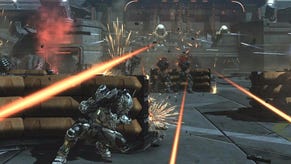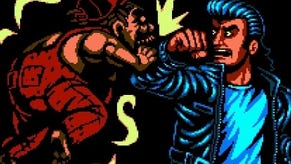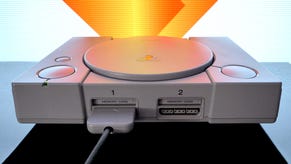Is Vanquish a four-hour game?
Computer says no.
Platinum Games' Vanquish launched in Europe yesterday to a range of mostly positive reviews, including a glowing 9/10 score from Eurogamer. However, comments from a lukewarm Game Informer write-up stating that Vanquish could be completed in under four hours have raised alarm for many players, along with incredulity from Platinum Games' writer JP Kellams.
In an age where games are still expensive enough to be considered investments rather than impulse buys, does Vanquish offer enough to warrant its price-tag? Digital Foundry decided to put this to the test. During the creation of our Face-Off coverage, I captured our entire playthrough of the game on Xbox 360 - a mammoth 1.29TB of lossless 720p60 game footage, and subsequent to the feature's completion I rounded off my playthrough of the PlayStation 3 game.
While Vanquish maintains its own in-game timers that measure progress as you move from level to level, by stitching together all of the captures into one enormous video, we can time exactly how long it took to complete the game. The result? Eight hours, 47 minutes. However, my completion stats were rather poor. I died many, many times: 54 to be precise, although admittedly many of them were down to one particular boss with an extremely annoying one-touch kill attack. Regardless, the completion stats made it clear that there was still much to learn in mastering this game... which is perhaps the whole point.
But to address the game length issue, let's get a measure of Vanquish's actual game content by cutting out all the cut-scenes, removing all of our deaths and giving it to you straight from start to finish. Is it conceivably possible that you can complete it in under four hours? Here's the entirety of the game presented in just 15 minutes of accelerated gameplay. There's a timer in the top-left to give you an idea of the passage of time as the game was played.
We're with JP Kellams on this one. Even in these ultra-optimistic conditions, the timer winds up at five hours, four minutes. Beating that time on your first playthrough of the game by over an hour would require the ability to sail through losing no lives whatsoever, intimately knowing all the strategies required to beat each level right off the bat. In short, unless you're a superhumanly adept player with a phenomenal gift of foresight, the chances of you completing the game in under four hours are extremely remote.
All of which misses the whole point of the game completely of course. You can approach this game like a Gears of War clone and play it to complete it, and you can have a reasonably fun "7/10" experience doing so, but this is clearly not the kind of game that Platinum set out to make.
That the Bayonetta studio's latest effort is being described at all as a four, or indeed five hour game is perhaps symptomatic of the way that games have evolved over the years. There's a danger that games are no longer defined by their gameplay, but in terms of "content".
Home videogames initially took shape based on their arcade cousins - players had a set amount of lives, and if they were lucky an additional number of "continues" or credits that reset the clock, allowing them to play on with score counter reset to zero. Energy bars were added as a further mechanic for extending a player's reach into the the game.
However, over the years gaming became more of a mainstream pastime and the arcade format became more and more irrelevant to the ways in which home games were actually being played. Developers were faced with the uncomfortable truth: the audience was paying a lot of money and in many cases never actually experiencing much of the gameplay the creators had spent so much time putting together. The concept of a player's in-game mortality began to evolve.
The situation has now been changed radically, to the point where Ubisoft can confidently claim that an impressive 40 per cent of the people who played Assassin's Creed II completed the game - no mean feat bearing in mind that it offers an epic 24 hours worth of gameplay.
It's safe to say that the concept of game difficulty and value for money has shifted immeasurably across the years. The vast majority of releases endow the player with infinite lives - remember when that used to be a cheat? Even the concept of energy bars has been radically re-shaped. Remember how we chuckled at The Getaway on PS2 for letting you regain energy by leaning against a wall? In most, if not all of today's mainstream shooters, this is now effectively the standard - but with no wall-interfacing required. There's a strong argument that with players effectively granted in-game immortality, the whole concept of a game's value proposition has fundamentally changed. We demand high-quality gaming as standard, the measure has now shifted to how much of it we get.
In some ways, this is a good thing - it's progress, reflecting the fact that most players aren't endowed with superhuman gaming skills but want to get the most out of their purchases. Let's face it, an arbitrary limit on "lives" and "continues" would serve absolutely no purpose whatsoever on most games released today other than to piss off the audience.
You can call ACII a 24-hour game and perhaps that is a decent enough barometer of its value. But Vanquish is different. It's not really a content-driven game. Your first playthrough will most likely take between seven or eight hours (excluding cut-scenes), but the chances are you'll finish the game knowing that you could do so much better playing it through again - and crucially, that you'll have plenty of fun doing it. Vanquish retains the immortality angle of modern gaming, but deducts your score to reflect how many times you die during gameplay just like the "continues" from days of yore. It'll let you battle through in an infinite lives-fuelled war of attrition against the campaign mode if you really want to, but the real key to success is in learning how to play the game well.
The long-term appeal is based exclusively on the idea that you are given a phenomenal range of combat mechanics and the game encourages you to push them to their limits. It's a game that practically begs you to play and replay it because the reward isn't in completing it, it's in experiencing it. Vanquish becomes ever-cooler the better you become playing it. Its design tempts you into taking extraordinary risks in order to produce some phenomenally cool moments of slow-motion bullet-time gameplay. There's a unique, satisfying feeling of accomplishment from playing it well that completely transcends the achievement of just completing the game's 25 levels.
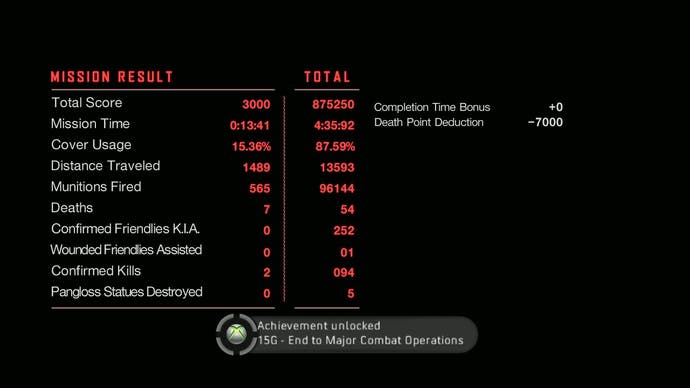
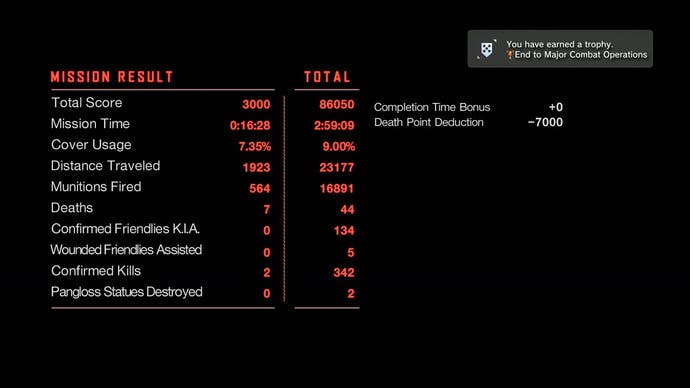
So where does the four-hour game time actually come from? The final stats screen of my PS3 runthrough says I finished the game in 2:59.09. I skipped just about all of the cinematics on my second playthrough and a compilation of all my captures gives a six hour, 13 minute timing. So either the timer's wrong or else it's measuring something different, like the duration of the individual play session as opposed to a running total of progress through the whole campaign. However, confusing matters is that the other elements of the rundown do look accurate for the whole duration of my playthrough.
With the four-hour game matter settled, the controversy does indicate that some critics don't agree with my thoughts on why this game is so cool, and it does point out something quite valuable that should be factored into the purchasing decision. Judged as a standard, content-driven shooter, the 7/10 and 3.5/5 scores make sense. However, if you're more than a content completist and you buy into this idea of the gameplay experience itself offering value over and above the length of its missions, then in my view it's one of the best single-player shooters money can buy.


